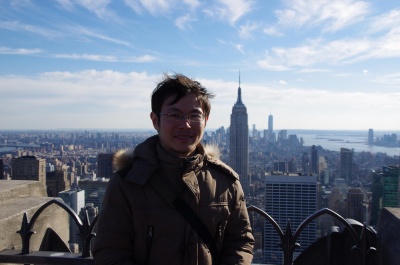- You are here:
- Home
April 19, 2016
| Atlanta, GA
What is your research about?
The world intrinsically contains multiple scales, and one theme of my research is to develop theories and algorithms that help us understand how different scales interact.
One classic example is the following astronomical problem. It is well known that planets rotate around their host star due to mutual gravitational attraction. For instance, Earth finishes one period of rotation around the Sun in exactly one year. Pairs of planets also experience mutual gravitational attractions, but such interactions are much weaker and the immediate effects are not obvious, especially if one considers only hundreds of years in the stellar system.
Nevertheless, the sun burns for billions of years, and over this much larger timescale, microscopic planet-planet interactions do accumulate. The question is, Will this accumulation lead to large changes of the planet orbits? Or more generally: How do small-scale details cascade to large scales?
Quantifying such cascades across scales is critical for many important questions, such as, Will Earth keep its current distance from the Sun and maintain its nearly circular orbit, both which are essential for sustaining the climate that fosters current life forms? Where was Earth when it formed billions of years ago? Can we predict the existences of planets outside the solar system, given that we can only see stars but not planets, due to planets' small sizes and faint luminosities? Will these so-called exoplanets be habitable?
Applications are not limited to the sciences. For instance, we have been using fast oscillations (e.g., laser) to control slower engineering systems. In this sense, my group addresses both scientific curiosity and engineering practicality, and that is one thing I enjoy about developing general methodologies.
What has been the most exciting time so far in your research life?
When scientists, engineers, and I collaborate, we always iterate many times to carefully formulate the problems, solve the core difficulties, and interpret the results. It is also the case when I work on mathematical proofs. Serendipity seldom happens to me; what happens more often is many solid little steps. All I do is prepare myself by thinking constantly, so that whenever good things happen they will not be missed.
How did you find your way to mathematics research?
Like many kids, I participated in informatics and mathematics Olympiads, which I found enjoyable. Such enjoyment may not be practical, as the competitions are serious and require significant training. I never qualified for the national teams to compete internationally, but my life has been positively changed.
In addition, my father, even though he was working in a non-STEM discipline, had an amazing curiosity about physics, and he motivated me by asking questions – such as, What are quarks made of? – when I had just learned to spell my name. Those questions sparked my life-long interest in how things work at microscopic and macroscopic levels. Therefore, it is a great pleasure to work in applied and computational math, as it provides a good blend of mathematics, informatics, and physics.
What advice would you give a college freshman who wants to be a mathematician?
Behind abstractness, there is almost always intuition.
If you could not be a mathematician, in what line of work would you be now?
In the financial industry, because of my interests in probability and differential equations; a programmer because of my experiences with algorithms; a professional gamer because of my playful nature; or house husband because of my ever-expanding to-do list of house work.
What is the most exciting thing about being a part of Georgia Tech?
Everyday Im discovering new exciting things, but so far what I have enjoyed the most is that Georgia Tech is one of the best technology schools, where stellar scientists, engineers, and mathematicians are just doors away, open to engaging discussions. I have equally enjoyed working with the wonderful students, who are positive, modest, eager to learn, and contributing to a lively campus life.
What are you most surprised about in your encounters with Georgia Tech students?
Given how good a university Georgia Tech is, the students are really modest and objective. Teachers should of course always try to teach as well as they can. But sometimes students do not try hard enough to learn, and whatever they cannot learn is the teacher's fault. This blaming of the teacher seldom happens here; instead, the relationship between students and teachers is generally healthy, with objective mutual feedbacks promoting quality education.
Tell me about an unusual skill, talent, or quality you have now or in the past that is not obvious to your colleagues.
I normally don't sing out of tune.
What is your ideal way of relaxing?
I enjoy many common ways of relaxing, except for drinking alcoholic beverages. Because I cannot work more than 10 hours per day in a sustainable way, I do relax quite often.
If you won $10 Million in a lottery, what would you do it?
One part of my research is on rare events modeling and simulation. I, like many others, claim that small- or zero-probability events will never happen. Consequently, to characterize these nevertheless important events, it is necessary to conduct extra analysis and design biased algorithms. Winning the lottery would shatter my research premise, and therefore I would mourn for a while. Then I will secretly invest the money.

